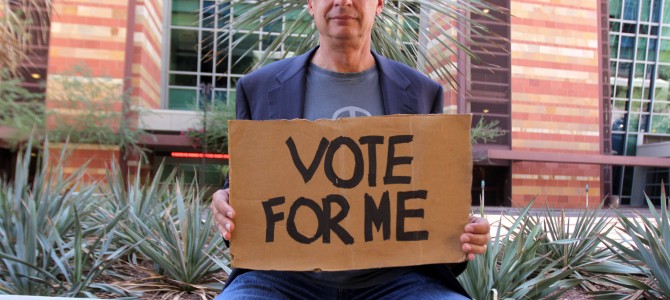
“Social conservatives aren’t victims. They’re enablers,” writes The Washington Post’s Jennifer Rubin. On the one hand, they are waaay too principled, she argues, digging their own political graves by treating “lost causes as make-or-break issues.” Yet, simultaneously, they’re also too unprincipled, caving to Trump and destroying the Republican Party with their rank hypocrisy.
Apparently, Rubin is concerned that a similar fate might befall the Libertarian Party if it starts flirting with these “fringe characters.” She aims most of her indignation at the Washington Examiner’s Tim Carney, who recently argued that Libertarians lost an opportunity to lure disillusioned conservatives by picking socially liberal candidates opposed to religious liberty: Gary Johnson and Bill Weld. Ben Domenech has made a similar case at The Federalist.
Rubin, who has an aversion to both social conservatives and libertarians, says there is no common ground to be found:
For one thing, Libertarians would lose their base, and for another, most social conservatives are not going to be lured by the prospect of fudging on abortion or gay marriage. (Johnson and Weld ascribe to the ‘serve all comers’ side in the wedding cake wars, in keeping with Johnson’s affection for the Civil Rights Act of 1964.)
Would the Libertarian Party really lose its base over abortion?
Consider this: the most popular libertarian politician over the last 30 years is probably Ron Paul, who maintained that abortion on demand was the “ultimate state tyranny.” The only libertarians elected to Congress — Rand Paul, Justin Amash, and Tom Massie — are all pro-lifers. Perhaps a libertarian’s electoral success is predicated on being pro-life. Whatever the case, the “libertarian base” is obviously pretty comfortable with the idea. It’s the only party left that could house people with both viewpoints.
Or was.
At Reason magazine, Nick Gillespie offers a far more compelling take on all the tension between these two camps, arguing that the Johnson/Weld ticket merely preaches “fiscal conservatism and social liberalism.”
Is that what libertarianism is about: preaching social liberalism? Or is it about offering a system of governance that allows people to live as they please with minimal interference from the state? Because the latter position might hold great appeal across a number of cultural lines, while the former makes libertarians sound like a bunch of progressives who might want to cut taxes one day.
For instance, Gillespie argues just “as you can be against drug prohibition but against drug use, you can argue strenuously against abortion while not believing it should be banned by the state.” I strongly agree with this reasoning. In the same way, though, a person can also be strenuously against “discrimination” and “transphobia” and still believe in free association and religious liberty. Yet the arrangement seems to skew in one direction these days.
You may have noticed, for example, that while there’s no room for a pro-life VP candidate in today’s pro-choice Libertarian Party, an eminent domain-loving politician who backed gun control and supported the Iraq War and the Patriot Act will do just fine. This bolsters Carney’s argument that Johnson not only leans socially liberal, but also supports “left-wing social engineering enforced at gunpoint” and a platform that “reeks of raw identity politics.”
I mean, if you believe the state has a right to force Jews to bake Nazi cakes or to put Christians out of business for following their long-held beliefs, you are anti-liberty by any standard. Johnson embraces these views because Johnson, like many Libertarians, is more interested in attracting cultural liberals to his party than those already predisposed to caring about individual liberty.
(By the way, Rubin’s contention that Johnson’s position is merely “serve all comers” has nothing to do with reality, as these Christian bakers and florists already serve “all comers.” They simply won’t participate in ceremonies that undermine their religious beliefs. If more columnists at major papers laid out these facts, perhaps more Americans would understand the issue. But that’s another story.)
In many ways, the culture of contemporary Libertarianism already feels inhospitable to conservative Americans — and I mean “conservative” in its purest form. Contemporary Libertarianism often has an urban and secular sensibility that radiates disdain for religious Americans and traditionalists. Johnson, in fact, embraces non-libertarian ideas just to appeal to people who share this disdain.
But libertarians won’t entice the average progressive, even if his views happen to converge incidentally with libertarian positions from time to time on drugs or gay marriage or whatever else. The core idea of individual freedom is antithetical to a progressive’s belief system. Meanwhile, social conservatives (and conservatarian types), are already making philosophical arguments for limiting the scope, reach, and size of government on an array of fronts — including education, gun rights, and economic freedom.
In fact, for all the bad things Republicans get behind, they’ve done more on these fronts in tangible ways than any libertarian.
One imagines some (not most, but some) social conservatives already familiar with libertarian ideas and rhetoric would embrace a political party that defends free trade, fewer regulations, school choice, and a more restrained foreign policy. As I’ve argued before, one day evangelicals will have to come to terms with public policy that allows others to engage in activities they find morally disagreeable. But asking them to support a party whose candidate advocates forcing them to do things they find morally disagreeable is another thing entirely. By doing exactly that, Johnson and Weld, chasing the Jennifer Rubin vote, have made it impossible for many social conservatives to consider their party. It’s needlessly antagonistic — or, more likely, purposefully adversarial.









